#a.d. 336
Text
History
December 25th - Christmas Day, commemorating the birth of Jesus of Nazareth. Although the exact date of his birth is not known, it has been celebrated on December 25th by the Western (Roman Catholic) Church since 336 A.D.
December 25, 1066 - William the Conqueror was crowned King of England after he had invaded England from France, defeated and killed King Harold at the Battle of Hastings, then marched on London.
December 25, 1776 - During the American Revolution, George Washington took 2,400 of his men across the Delaware River. Washington then conducted a surprise raid on 1,500 British-Hessians (German mercenaries) at Trenton, New Jersey. The Hessians surrendered after an hour with nearly 1,000 taken prisoner by Washington who suffered only six wounded (including future president Lt. James Monroe). The victory provided a much needed boost to American morale.
December 25, 1868 - President Andrew Johnson granted general amnesty to all those involved in the Civil War.
December 25, 1926 - Hirohito became Emperor of Japan.
December 25, 1989 - In Romania, a television broadcast of a Christmas symphony was interrupted with the announcement that Nicolae Ceausescu and his wife had been executed following a popular uprising. A pro-democracy coalition then took control. Ceausescu, a hard-line Communist, had been ousted from power after ordering his black-shirted state police to suppress a disturbance in the town of Timisorara, resulting in the deaths of an estimated 4,500 persons.
Birthday - Isaac Newton (1642-1727) was born in Woolsthorpe, Lincolnshire, England. He was a mathematician, scientist and author, best known for his work Philosophiae Naturalis Principia Mathematica on the theory of gravitation. He died in London and was the first scientist to be honored with burial in Westminster Abbey.
Birthday - American nurse and philanthropist Clara Barton (1821-1912) was born in Oxford, Massachusetts. She served as a nurse during the Civil War and in 1881 founded the American Red Cross.
Birthday - The founder of the Islamic Republic of Pakistan, Mohammed Ali Jinnah (1876-1948) was born in Karachi.
Birthday - Film actor Humphrey Bogart (1899-1957) was born in New York City. Best known for The African Queen, The Maltese Falcon, Casablanca and To Have and Have Not.
2 notes
·
View notes
Text
Today in History: Today is Monday, Dec. 25, the 359th day of 2023. This is Christmas Day.
On this date: In A.D. 336, the first known commemoration of Christmas on Dec. 25 took place in Rome.
By The Associated Press
Today’s Highlight in History:
On Dec. 25, 1776, Gen. George Washington and his troops crossed the Delaware River for a surprise attack against Hessian forces at Trenton, New Jersey, during the American Revolutionary War.
On this date:
In A.D. 336, the first known commemoration of Christmas on Dec. 25 took place in Rome.
In 1066, William the Conqueror was crowned King…
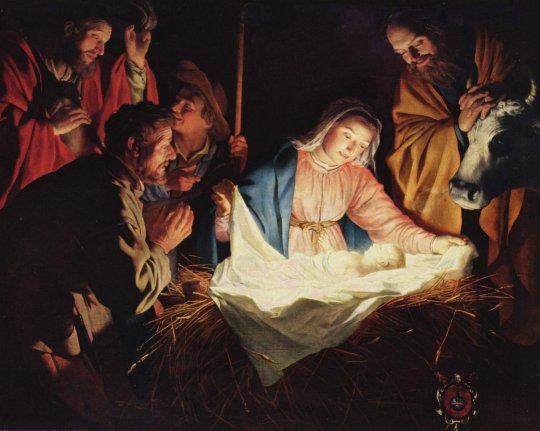
View On WordPress
0 notes
Text
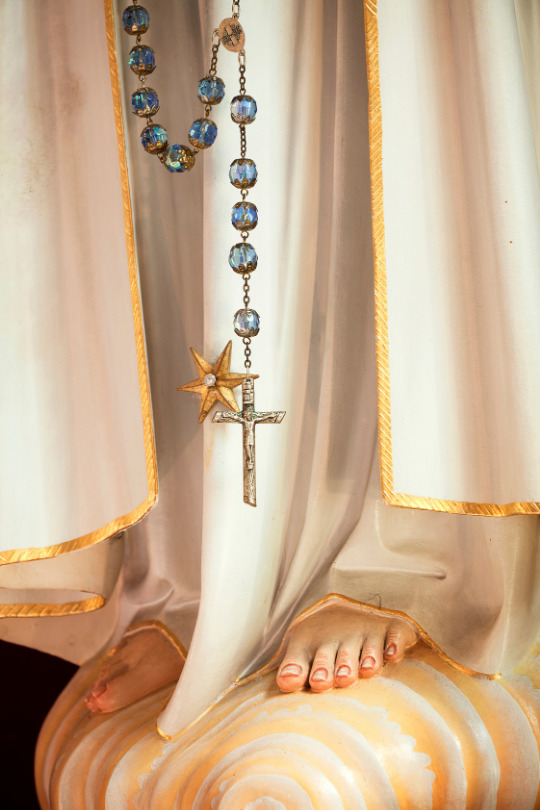
Saint of the day October 07
St. Canog, 492 A.D. Martyr and eldest son of the local king of Brecknock in Wales. He was slain by barbarians at MerthyrCynog. In Brittany, France, he is called St Cenneur. Several churches in Wales honor him.
St. Osyth, 700 A.D. Martyred nun, also called Osith and Sytha. Known mainly through legends, she was supposedly the daughter of a chieftain of the Mercians in England and Wilburga, daughter of the powerful pagan king Penda of Mercia. Raised in a convent, Osyth desired to become a nun but was married against her will to King Sighere of Essex, by whom she had a son. Eventually, she won his permission to enter a convent, and she established a monastery on land at Chich, Essex, donated by Sighere, where she served as an abbess. She was reputedly slain by Danish raiders and is thus depicted in art as carrying her own head. There are historical difficulties associated with her existence, especially as no mention is made of her by Bede in his Ecclesiastical History.
Sts. Sergius & Bacehus, Roman Catholic Martyrs. they were officers in the legions of co-Emperor Maximian in Syria who refused to enter the temple of Jupiter or to make sacrifices to the gods. For their crimes, they were dressed in women’s clothing and led through the streets of Arabissus before being sent to die in Mesopotamia. Bacehus was flogged to death, and Sergius was scourged. and beheaded.
St. Justina of Padua, Roman Catholic Martyr. A young woman who took private vows of chastity and was killed during the persecutions of the Roman emperor Diocletian. She is a patron saint of Padua. Her feast day is October 7.St. Dubtach, 513 A.D. The Archbishop of Armagh, Ireland, from 497 until his death.
St. Helanus, 6th century. Irish hermit who went to France with six brothers and three sisters. They settled in Reims, where Helanus became a priest.
Our Lady of the Rosary-Today's feast was introduced by St Pius V, who was also a Dominican, in gratitude for the victory of Christian fleets under Don John of Austria, against the Turkish forces on this day in 1571. Pope Leo XIII was particularly devoted to Our Lady of the Rosary, producing 11 encyclicals on the subject of this feast. In the first of them, 1883's 'Supremi Apostolatus Officio' he echoed the words of the oldest known Marian prayer (known in the Latin tradition as the 'Sub Tuum Praesidium'), when he wrote: "It has always been the habit of Catholics in danger and in troublous times to fly for refuge to Mary."
"Turkish victory at Lepanto would have been a catastrophe of the first magnitude for Christendom," wrote historian John F Guilmartin, Jr "and Europe would have followed a historical trajectory strikingly different from that which obtained."
Pope St. Mark, Roman Catholic Priest and Pope, successor to St. Sylvester I , elected January 18, 336. He was the son of Priscus and a priest of Rome. During his pontificate he erected two basilicas on land donated by Emperor Constantine I. Feast day is October 7.
0 notes
Text
Subject: What Is The Christmas Spirit
References:
Holy Bible Gen-Rev
How many actually know what the true Christmas Spirit is. What is the true Spirit of Christmas and how does that Spirit never change from one year to the next?
The designer clothes we wear change in design change every year; the gifts we give are not like they were 10-20 Years ago.
Even the Christmas Decorations we use to decorate our Homes, Christmas Trees, and Properties have change, but the True ‘Christmas Spirit’ has not and will not ever change.
To Celebrate Christmas in a truly Faithful Way, we must get into the Christmas Spirit that is genuine, real and never ending.
In order to discover the True Christmas Spirit We Must Go Back to the First Christmas and there we will discover the true Christmas Spirit.
December 25 has long been celebrated for its relationship to light. Back in A.D. 274 an Emperor of the old Roman World chose December 25 as "the birthday of the unconquered sun."
He recognized that at this midwinter date, the sun reaches its lowest point in the southern sky and begins its gradual movement northward again.
The annual rebirth of nature was closely linked to the Roman new year and planting season.
Houses were decorated with greenery and candles, and presents were given to children and the poor. In time, Christians made this a holy day of their own.
By A.D. 336, the Church had decided that all believers should celebrate the birthday of the Lord Jesus, the Son of God, Son of Man, The Son Of Righteousness, on December 25.
He said that He came into the world to seek and to save that which was lost.
To Celebrate Christmas fully and properly we must go all the way back to that night long ago when a Shepherds first heard that a Savior was born.
There were some elements in that first Christmas which ought to be in Christmas this year and every year for the children of God.
When we go back to those divine elements of Christmas, we find the True Christmas Spirit Alive and Well.
We need to be lifted up from the Mundane to the Miraculous, from a Pandemic to Praise, and from Riots to Rejoicing. Our focus is too often fixed on the sinful, sick, and sad results of human sin.
Everywhere we look we see the Spirit of Disobedient. In the days of Genesis, Our Fathers: Abraham, Issac, And Jacob would have put the disobedient, rioters, and law breakers to death to Stamp Out Sin In Israel.
The Heads of Families would have escorted the breakers outside of the City Gates and Execute Them By Stoning.
If we were to apply the same discipline today, the disobedient and lawlessness would quickly fade way.
However Satan has release his Fire from Hell upon our lands. And our aren’t Spiritually Equipped to deal with Spiritual matters.
Things were no different on that night in Tiny Bethlehem when Angels visited the Shepherds. Think of the circumstances the people of Israel faced on the night Jesus was laid in the Manger.
A godless, uncaring king sat upon the throne in Jerusalem
Tax collectors defrauded the people of their hard-earned and much-needed incomes
Disease and demon possession were everywhere
Hypocritical religious leaders had total control of the worship
Things were very bleak indeed for the citizens of Israel on that night when Angels appeared in the sky.
The Earth itself was in Spiritual Darkness. Don't get the idea in your head or heart that the first Christmas was some idyllic, postcard kind of experience. People were living in very dark and difficult times, just like you and I are living in today.
Christmas brought the opportunity for remarkable and Eternal change to the lives of those willing to embrace the One born that night.
Christmas is to remind us that life is more than shopping malls, news reports of death and corruption, family strife and getting just what we want wrapped in a multicolored box.
Christmas is about changing our focus from the Nature to the Supernatural, from the Secular to the Spiritual, from the Worldly to the Worshipful aspects of life.
Whatever may have divided the Shepherds that night was quickly forgotten. Race, income, grudges, politics and the like were swept away in the Glory of being told that a Savior had been born.
The message of Christmas is “Peace on Earth.” This Peace is ours when we turn our hearts and heads toward Christ.
If we do this, we will begin to forget ourselves and will be united in love and worship. The Shepherds said to one another, “Let us go and see this thing which has come to pass.” They were united in Wonder, united in Purpose, united in Desire. They were ready to do something "together."
Christmas should cause us to lay aside the things which may divide us and turn us instead to the One who Unites Us.
This is a wonderful time to bury an old grudge, forget an injury done to you by someone yesterday, or some other disappointment from long ago.
After all, think of how much God loved you when He sent His Son, fully knowing at the time what the World would do to Him. Yet He loved us that much. No wonder the shepherds joined hands and went together to see the Christ child.
If you experience the True Spirit of Christmas it will cause you to lay down old grudges. You will forget about yourself and turn to the Savior who did not hold your sin against you, but came to redeem and forgive you. That my is what The Christmas Spirit is All About.
Peace On Earth-Good Will To All Men (Inclusive of Male and Female), Amen.
WORD
Servant DCarlos Phipps
0 notes
Text
Christmas is an annual festival commemorating the birth of Jesus Christ. Because of the uncertainty about the month and date of Jesus's birth, several hypotheses argue that the first celebration dates back to 336 A.D.
0 notes
Text
the assassination of Tiberius Gracchus (133 BC)
Tiberius Sempronius Gracchus was a Roman politician, elected as plebeian tribune (an office originally set up to protect the interests of the common people) in 133 BC. The same year, he was beaten to death along with his supporters in a riot sparked by his opponents. Gracchus' death commonly marks a key turning point and the beginning of the fall of the Roman Republic.
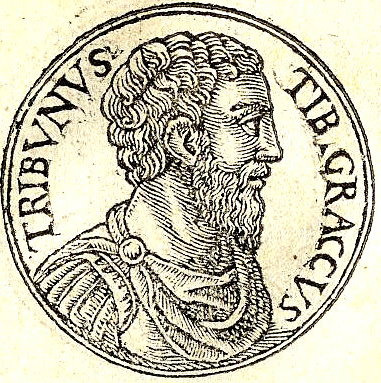
(1553 depiction of Tiberius Gracchus in Guillaume Rouille's Promptuarii Iconum Insigniorum)
According to Plutarch in his The Parallel Lives, Tiberius was more gentle, reasonable, and agreeable, while his younger brother Caius was fierier and more high-tempered. Nevertheless, when it came to "bravery in the face of the enemy, just dealings with subject peoples, scrupulous fidelity in public office, and restraint in pleasurable indulgence", the brothers were the same. Their father, also named TIberius Gracchus, was a Roman consul and a member of one of Rome's leading families, the gens Sempronia. Their mother, Cornelia, was a political and cultural figure, and the daughter of Scipio Africanus, the man who defeated Hannibal during the Second Punic War.
Prior to his political career, Tiberius served in the military and won renown for his courage, being one of the first to scale the enemy fortifications in Carthage during the Third Punic War. His individual merit, as well as his status and birth, allowed him to be elected as tribune of the people in 133 BC.
Tiberius proposed a new agrarian law: under it, no citizen was allowed to hold more than 500 jugera (around 330 acres) of ager publicus, i.e. state-owned land that had been acquired during wars. Excess land would be confiscated and redistributed among the poor. The law was vehemently opposed by the Senate, as it would result in many senators losing their land and thus the source of their wealth.
The law was eventually passed, but in the process Tiberius had to depose another tribune, Marcus Octavius, and animosity began to build against Tiberius. He sought re-election as tribune, an unprecendented move as re-election had not been practiced for 300 years, and a move that some saw as illegal.
During elections, Tiberius was told that he was to be assassinated, causing him to place his hands on his head. His enemies interpreted this as his desire to wear a crown and become king, and this news was carried to the Senate. Enraged, a posse of senators and their supporters, led by Tiberius' cousin Scipio Nasica, rushed to where Tiberius was observing the elections. Armed with stools, stones, clubs, and various weapons, they beat Tiberius and his supporters to death.

(The Death of Tiberius Gracchus by Lodovico Pogliaghi, circa 1890)
Tiberius Gracchus' actual motivation for his actions is disputed. Some argue that he was genuinely trying to make reforms and help the poor, while others argue he was exploiting social concerns and trying to gain power for himself.
Tiberius was succeeded by his brother Caius, who continued to make social reforms. In 121 BC, Caius was also killed (or committed suicide, sources give varying accounts), although this time with explicit Senate approval.
part 2/25 of a series introducing the assassinations outlined in Francis John's 1903 book, Famous Assassinations of History from Philip of Macedon, 336 B.C., to Alexander of Servia, A.D. 1903
#history#ancient history#roman history#ancient roman history#ancient rome#classics#tiberius gracchus#caius gracchus#historical deaths#roman republic#historical assassinations series#.#long post
0 notes
Text
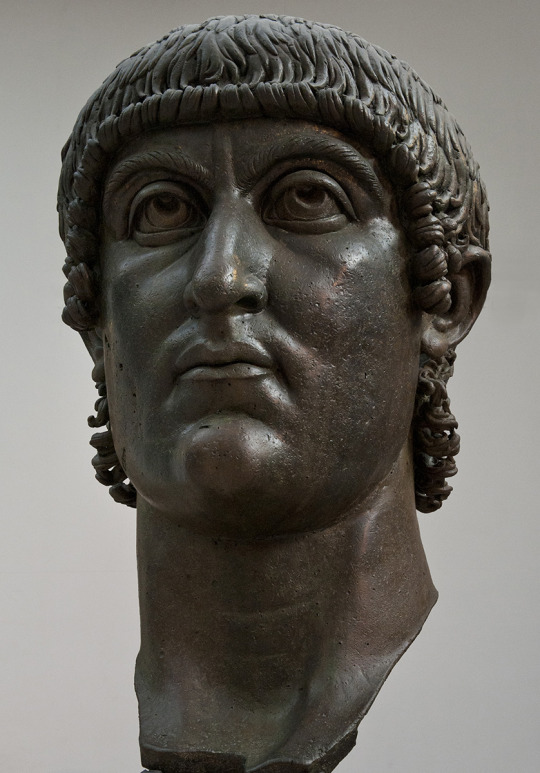

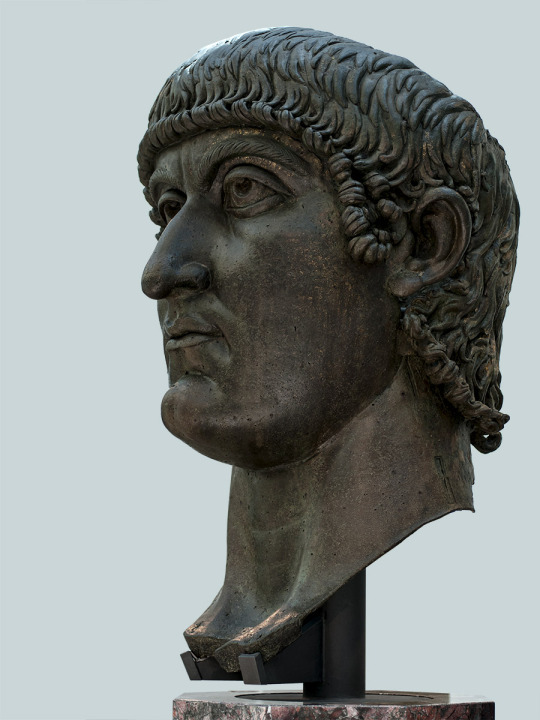
~ Constantine the Great.
Date: A.D. 336-337
Medium: Bronze
Provinience: Rome, Capitoline Museums, Palazzo dei Conservatori, Marcus Aurelius Exedra (Roma, Musei capitolini, Palazzo dei Conservatori, Esedra di Marco Aurelio)
#ancient#ancient sculpture#ancient art#ancient history#ancient portrait#ancient statue#history#archaeology#museum#constantine the great#a.d. 336#a d. 337#4th century
250 notes
·
View notes
Photo
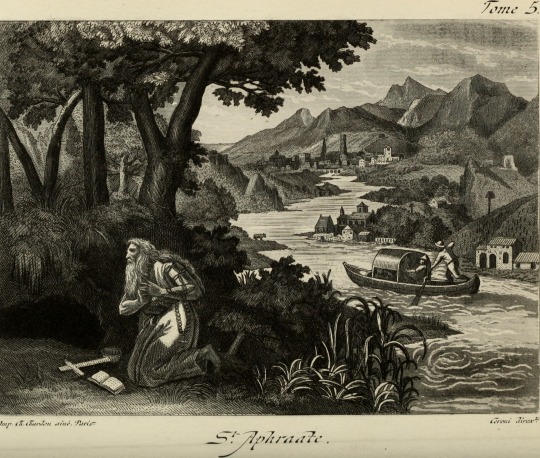
“Great is the gift which he that is good has given to us. While not forcing us, and in spite of our sins he wants us to be justified. While he is in no way aided by our good works, he heals us that we may be pleasing in his sight. When we do not wish to ask of him, he is angry with us. He calls out to all of us constantly; ‘Ask and receive, and when you seek, you shall find’” (Treatises 23:48 [A.D. 336-345]). - Saint Aphraates
12 notes
·
View notes
Text
Diogenes to Alexander the Great, 336 A.D.
282 notes
·
View notes
Text
History
December 25th - Christmas Day, commemorating the birth of Jesus of Nazareth. Although the exact date of his birth is not known, it has been celebrated on December 25th by the Western (Roman Catholic) Church since 336 A.D.
December 25, 1066 - William the Conqueror was crowned King of England after he had invaded England from France, defeated and killed King Harold at the Battle of Hastings, then marched on London.
December 25, 1776 - During the American Revolution, George Washington took 2,400 of his men across the Delaware River. Washington then conducted a surprise raid on 1,500 British-Hessians (German mercenaries) at Trenton, New Jersey. The Hessians surrendered after an hour with nearly 1,000 taken prisoner by Washington who suffered only six wounded (including future president Lt. James Monroe). The victory provided a much needed boost to American morale.
December 25, 1868 - President Andrew Johnson granted general amnesty to all those involved in the Civil War.
December 25, 1926 - Hirohito became Emperor of Japan.
December 25, 1989 - In Romania, a television broadcast of a Christmas symphony was interrupted with the announcement that Nicolae Ceausescu and his wife had been executed following a popular uprising. A pro-democracy coalition then took control. Ceausescu, a hard-line Communist, had been ousted from power after ordering his black-shirted state police to suppress a disturbance in the town of Timisorara, resulting in the deaths of an estimated 4,500 persons.
Birthday - Isaac Newton (1642-1727) was born in Woolsthorpe, Lincolnshire, England. He was a mathematician, scientist and author, best known for his work Philosophiae Naturalis Principia Mathematica on the theory of gravitation. He died in London and was the first scientist to be honored with burial in Westminster Abbey.
Birthday - American nurse and philanthropist Clara Barton (1821-1912) was born in Oxford, Massachusetts. She served as a nurse during the Civil War and in 1881 founded the American Red Cross.
Birthday - The founder of the Islamic Republic of Pakistan, Mohammed Ali Jinnah (1876-1948) was born in Karachi.
Birthday - Film actor Humphrey Bogart (1899-1957) was born in New York City. Best known for The African Queen, The Maltese Falcon, Casablanca and To Have and Have Not.
1 note
·
View note
Text
So a few days ago I was on Reddit (bet you can't guesss the username) and while looking through R/UnpopularOpinion I ran into a post about how basically consumerism is what makes Christmas special. I and a few others dropped into the comment section to very quickly point out how that was wrong (though that's a discussion for a different post) and it was very quickly removed by the poster.
Though it wasn't quick enough to prevent some other user from coming in and hate bashing our stance with "Jesus was born in spring and Puritans were just trying to eradicate pagan holidays!"
...yes, you read that right, Puritans, as in the 16th century.
So I responded with two things, one of which is regarding the destroying pagan holidays part that I will look at in greater detail later. The part that matters in this setting is that I said, "Uh, by Puritans you mean early Christians, right? Those are not the same thing? I am not sure you understand what you're taking about..."
The response was : "How DARE you question my understanding of religious history! I believe in the Greek gods, and all my Christian relatives think I'm crazy because of it, so therefore I know more about it than you and you don't get to question my expert opinion at all! I hate people like you!"
He also apparently believed that Christmas wasn't a holiday until the Middle Ages. (The first recorded Christmas was in 336 A.D., about 130 years before the sack of Rome and the beginning of the Middle Ages.)
I dunno where I was going with this. Maybe just a general, don’t join conversations just to be a dick? Especially when you don’t actually know what you’re talking about? And also don’t try to make me feel like a piece of shit because I refuse to buy into your hateful narrative and you’re saying things that are objectively not true?
I’m definitely going to talk about the context of this a lot more in further posts, but I really wanted to get this one off my chest.
2 notes
·
View notes
Text
ORIGINS OF CHRISTMAS CUSTOMS

Like Easter (Ishtar), Christmas has its origins in pagan religion. Many of its traditions are of relatively recent origin (1700s or 1800s). A Christmas Carol by Charles Dickens, for example, was first published December 19, 1843.
The first mention of December 25 as a date for Christ’s birth is on a Roman calendar in 336 A.D. The Roman Emperor Constantine legalized Christianity and…
View On WordPress
#America#Bible#Christ#Christian#Christmas#Church#Deception#Evangelical#false churches#false ministers#false teachers#Family#Gift#God#Holy Spirit#Jesus#Ministers#Obedience#prophecy#Religious#Truth#Worship
1 note
·
View note
Text
Saint of the day October 07
St. Canog, 492 A.D. Martyr and eldest son of the local king of Brecknock in Wales. He was slain by barbarians at MerthyrCynog. In Brittany, France, he is called St Cenneur. Several churches in Wales honor him.
St. Dubtach, 513 A.D. The Archbishop of Armagh, Ireland, from 497 until his death.
St. Helanus, 6th century. Irish hermit who went to France with six brothers and three sisters. They settled in Reims, where Helanus became a priest.
St. Osyth, 700 A.D. Martyred nun, also called Osith and Sytha. Known mainly through legends, she was supposedly the daughter of a chieftain of the Mercians in England and Wilburga, daughter of the powerful pagan king Penda of Mercia. Raised in a convent, Osyth desired to become a nun but was married against her will to King Sighere of Essex, by whom she had a son. Eventually, she won his permission to enter a convent, and she established a monastery on land at Chich, Essex, donated by Sighere, where she served as an abbess. She was reputedly slain by Danish raiders and is thus depicted in art as carrying her own head. There are historical difficulties associated with her existence, especially as no mention is made of her by Bede in his Ecclesiastical History.
Our Lady of the Rosary
Sts. Sergius & Bacehus, Roman Catholic Martyrs. they were officers in the legions of co-Emperor Maximian in Syria who refused to enter the temple of Jupiter or to make sacrifices to the gods. For their crimes, they were dressed in women’s clothing and led through the streets of Arabissus before being sent to die in Mesopotamia. Bacehus was flogged to death, and Sergius was scourged. and beheaded.
St. Justina of Padua, Roman Catholic Martyr. A young woman who took private vows of chastity and was killed during the persecutions of the Roman emperor Diocletian. She is a patron saint of Padua. Her feast day is October 7.
Pope St. Mark, Roman Catholic Priest and Pope, successor to St. Sylvester I , elected January 18, 336. He was the son of Priscus and a priest of Rome. During his pontificate he erected two basilicas on land donated by Emperor Constantine I. Feast day is October 7.
0 notes
Text
December 22nd // Full Moon in Cancer // “Home is Where the Heart is”
Merry Solstice!! Today marks the beginning of Yule, and brings us one day closer to the Christian celebration of Christmas!
#blog#full moon in cancer#fullmoonincancer#cancer#zodiac#winter solstice#yule#christmas#hillbillyhocuspocus#hillbilly hocus-pocus
7 notes
·
View notes
Text
sometimes i hate living with my family but then sometimes my dad walks into my room and says “wanna see a four hundred and twenty year old book documenting the burning of protestants that my friend found in a skip” so i guess it has its ups and downs
#just another day in the life u kno#why the fuck was someone throwing it out though??????#it's fuckin incredible i'll post some photos soon#it has an anglo saxon sermon in it from the year 336 A.D. !!!!#h.txt
0 notes